FIRST COMPANY ACQUISITION - INTERNAL EPISODE | E045 PODCAST
LISTEN TO THIS EPISODE
ABOUT THE EPISODE
George Stroumboulis sits down with Chris Hartswick, co-founders of Ideoli Group, in Washington D.C. to reflect on their recent business ventures while celebrating the grand opening of the F1 Arcade, a stunning venue illuminated with Ideoli’s custom LED lighting products.
The conversation delves into the complexities of acquiring a new company, including the learning curves and unexpected challenges they faced along the way. George and Chris provide valuable advice for others considering similar ventures, sharing insights on how the acquisition has helped them better serve their clients globally by expanding their reach and improving operational efficiencies.
The two also discuss how the merger has allowed Ideoli to enhance its product offering and customer experience, particularly in key projects like F1 Arcade, while highlighting the importance of adaptability and resilience in navigating new business challenges. Overall, the episode is a must-listen for entrepreneurs and business owners looking to understand the intricacies of acquiring and integrating new businesses into their existing operations.
Ideoli’s Website
Ideoli’s Instagram
Ideoli’s LinkedIn
Ideoli’s Twitter
“We need to approach it as the same way we’re approaching our life and ultimately, whoever we hire, they end up becoming family.”
MEDIA RELATED TO THE EPISODE
ABOUT THE “INVIGORATE YOUR BUSINESS” PODCAST
The Invigorate Your Business with George Stroumboulis podcast features casual conversations and personal interviews with business leaders in their respective fields of expertise. Crossing several industry types and personal backgrounds, George sits down with inspiring people to discuss their business, how they got into that business, their path to the top of their game and the trials and tribulations experienced along the way. We want you to get inspired, motivated, and then apply any advice to your personal and professional lives. If there is at least one piece of advice that resonates with you after listening, then this podcast is a success. New episodes weekly. Stream our show on Spotify, YouTube, Apple, Amazon and all other platforms.
ABOUT GEORGE STROUMBOULIS
George Stroumboulis is an entrepreneur to the core, having launched several ventures across multiple industries and international markets. He has held senior-level positions at progressive companies and government institutions, both domestically and internationally, building an extensive portfolio of business know-how over the years and driving profit-generating results. George’s ability to drive real change has landed him in several media outlets, including the front page of the Wall Street Journal. George was born in Toronto, Canada to his Greek immigrant parents. Family first. Flying over 300,000 miles a year around the world puts into perspective how important family is to George’s mental and emotional development. With all this travel to global destinations, the longest he stays even in the most far-out destination is 3 days or less - a personal rule he lives by to make sure he is present and involved in family life with his wife and three daughters. To read about George’s global travels, stay connected with his blog section.
STAY CONNECTED WITH GEORGE STROUMBOULIS
STREAM & LISTEN TO THE PODCAST:
SPOTIFY: https://open.spotify.com/show/1rW2CmxQoiJNEPOZupJlvd
YOUTUBE: https://www.youtube.com/user/Stroumboulis
APPLE iTUNES: https://podcasts.apple.com/us/podcast/invigorate-your-business-with-george-stroumboulis/id1607693240
AMAZON MUSIC: https://music.amazon.com/podcasts/8fc03929-71b3-483a-a64e-153e30b3d462/invigorate-your-business-with-george-stroumboulis
STROUMBOULIS SITE: https://www.stroumboulis.com/podcast
PODCAST SITE: http://www.invigorateyourbusiness.com
FOLLOW GEORGE STROUMBOULIS:
INSTAGRAM: https://www.instagram.com/georgestroumboulis/
YOUTUBE: https://www.youtube.com/user/Stroumboulis
LINKEDIN: https://www.linkedin.com/in/Stroumboulis/
TWITTER: https://twitter.com/Stroumboulis
FACEBOOK: https://www.facebook.com/georgestroumboulis
TIKTOK: https://www.tiktok.com/@georgestroumboulis
CONTACT GEORGE DIRECTLY: https://www.stroumboulis.com/connect
FULL SHOW TRANSCRIPT
George Stroumboulis: 0:00
Welcome to another episode of Invigorate your Business with George Stroumboulis. This episode comes from the nation's capital, Washington DC. It's an internal episode where I sit down with my business partner, Chris Hartwick, to talk about our business. We have some exciting new developments. We made a recent acquisition that helped strengthen our value proposition and our service offering for our clients around the world. We're also in town for a new store opening for a very high profile client, so we're going to talk about that a bit. We're going to talk about our partners that are supporting us to get there and we're just going to really dissect our business, as we do on these internal episodes. So very excited to jump into this from the nation's capital starting now. My name is George Strombolis and I'm extremely passionate about traveling the world, meeting new people and learning about new businesses. Join me as I sit down with other entrepreneurs to learn about their journeys. This episode of Invigorate your Business starts now. Okay, so let's jump into this. We are in beautiful city of.
Chris Hartswick: 1:11
Washington DC. Yeah, nice fall morning, sunny skies.
George Stroumboulis: 1:16
Sunny skies man. We got in yesterday, had a pretty amazing experience with a new client, existing client, new location and on a future episode we're going to sit down with our client and the end user and we're going to talk specifically about this location. So we can't give too much details, but really quick. That's why we're here. We haven't sat down together and done an episode, kind of a recap, of our business in several months why We've been through a lot. We've been through a lot right, and part of this episode we just want to talk high level. We've been busy going through our first and only acquisition, right. So we bought a company strategic move on our end to expand our service offerings, product offerings, internationally with what we're able to do here in the country, outside of the country. So that's just been an incredible learning curve. We've been on the acquisition side from, you know, being acquired by a larger company and what that looks like, but being the ones actually finding the right company, going through that why we did it. The finances it's consumed our life right and we're starting to get some breathing room and we'll get into all that. But it's been exciting.
George Stroumboulis: 2:31
But let's talk quickly about last night. We fly into Washington DC, nation's capital. Beautiful, it's just a beautiful city. You always forget when you come here. You always hear about the crime and the violence and all this stuff. Any capital around the world will always attract that right. But physically it's just cool structures here, so many nice restaurants too. They're just opening up left and right. It seems like things are back on track, but last night we went to the new F1 location. Right, formula One. They have their largest location they've ever built to date here in dc and we were part of the friends and family, you know, with our partners, killani and then with rick, and being able to go there and see our light fixtures. That we did. But this is just one of those new accounts that we started working with and now we're full-on expansion mode across the country. So just talk about the location you know. Know, just from our standpoint.
Chris Hartswick: 3:26
Yeah, I mean it's great it's in the new, you know Union Market District up and coming old warehouse district that's kind of turning around getting gentrified. You know you can get into that aspect of it. But overall, like DC is just booming, it seems to be expanding everywhere and, like you said, I think friends and family night it's always just an awesome night to go to, regardless of the client, because that's when you really get to see sort of the vibe it's putting out right. You get to see people interacting, you get to see just how the customer even sees it portraying, you get to see some of their sort of issues come up and how they deal with it in real time and it's just a really cool experience and an awesome, awesome client and an awesome concept.
George Stroumboulis: 4:10
Absolutely yeah, and our partner specifically. Usually we're brought in after the fact, right, when things are being built. ,Kilani, just very methodical in how we were integrated. Can you please go and check out their location in London? Right, get an idea for what they're trying to do. Right, we started there even before we were on the specs and really understanding the product, the concept of what they're trying to do. You know, getting involved in their location in Boston, coming here to DC and then just seeing their expansion. But it was so cool to be able to see the reaction of everyone involved, right, electricians, ownership, you know the staff, the know the staff, the servers, the distribution partners, and just seeing everyone interact. And then the main focal point was the discussion, aside from the simulators, where you're actually sitting in and experiencing that, which is pretty cool, right, you know the lighting being the second aspect and the features and everything. I loved it. And then I love the fact that they even wanted us to be there Part of this experience.
Chris Hartswick: 5:06
Absolutely.
George Stroumboulis: 5:06
So really cool. And then, anytime we're together which is not often enough we try to get together, flip on some cameras and just talk about our business, right, like we've been at this a decade. We've been going up, we've been going down, we've been just rollercoaster ride and I think it's been incredible to be able to document along the way. The feedback's been incredible, just from oh yeah, we're experiencing that, or what about this? Or what if you tried this? It's like it's just creating a community of our standpoint and anything we talk about. By no means are we experts in everything. We're always trying to learn, you know. And then this whole acquisition process was just, yeah, we learned a lot.
Chris Hartswick: 5:44
Yeah, and I'm sure you know, because it was our first time, I'm sure it took longer than maybe it should have. You know, just contracts dealing with the attorneys working with the banks, like it's. It's a lot. You don't sort of fully comprehend all the little nuances associated with trying to merge to completely well, I was going to say two completely well, I was going to say completely different but very similar businesses. But when you get into all those details you find out how different things are Right and every little detail matters and it turns into another week delay here and five days there and it's a lot and, like you said, like just consumed our life for the last two and a half three months. Oh yeah, but a tremendous experience, tremendous experience.
George Stroumboulis: 6:32
Let's dissect this right. So let's share with the listeners the why right, like why did we make a strategic acquisition? Right, how, like physically, how did that happen? Right, you know the assets, all this type of stuff. We'll talk about the how and then why we're doing this. Let's talk about so far we're kind of in the middle of this too like what's been the hardest part of this? Some advice that we could give people, right, and then, why did we do this? From the future standpoint, what's that positioning us for growth, for international exposure, and what we're trying to do to build this business?
George Stroumboulis: 7:06
But if we go back to the why, we've, we're always re-evaluating our business, right, hey, what's working, what's not, and it's not just based on sales volume, it's just even from workflow, even from, you know, positions, not personnel specifically, but positions on hey, we have a team dedicated to this, but we don't really need this because the client's not valuing that. They just need this. So let's reallocate our resources. So we went through a whole evaluation on just roles, responsibilities, our whole flow of the business, and then where we said, hey, instead of building this from scratch, it's probably easier to just find the right partner that's also experiencing growth, right In a growth mode and that's where we found just an incredible company with tremendous assets, right Experience in the space and doing what we need to do. On a much smaller scale, but by working with them on a client basis, we were able to start working with them for projects that we're doing outside of the United States and really work out those kinks on. Okay, we like what they're doing here. We need to do this better and just having that collaboration with this company even before we thought about acquisition.
Chris Hartswick: 8:17
Right, you know Well, and I think you know we've talked about this in the past, probably on multiple podcasts, but in general, you have to be able to take that sort of step back and frequently take that step back as a business owner and say what's working, what's not. And you have to be willing to pivot or adjust, or whatever that may be, to the market demands or client demand, whatever is dictating that. You have to sort of holistically look at everything and say, all right, based on this, are we good, should we add, should we remove, should we change? So you know, you have to be able to do that and ideally, do that frequently. Right, absolutely.
Chris Hartswick: 9:00
And I think, like you said during this process, it was okay, you know, a few years ago it was hey, we can develop a side partnership. Right, we can develop this partnership based on where our international business is going and, luckily for us or unluckily, however, not unluckily but based on the planning. That partnership was developing very well, right, and we had a great setup going. We had a great development process going with this other company and it just kept growing, growing, growing, to the point where it was. I don't want to say easy to make the decision. But it was very clear to make the decision of hey, why don't we just roll this in the water?
George Stroumboulis: 9:40
Absolutely, absolutely. And while we're doing this, we aligned our values right, like it's when you're a smaller organization like Ideolias and you're looking at acquiring an even smaller organization from a people standpoint revenue and everything If you're not aligning values on that standpoint in that day to day, it's not happening right. Personality, work, ethic, all that stuff right With their key management team. It was just a great fit and we knew that for years. Right, just from that standpoint and what we embody, they embody, and just being able to bring that together was the right fit.
George Stroumboulis: 10:15
We have to be very vague in this and I know it's probably annoying for the listener. Like, what did you buy? What's the company name? What did you buy it for? I get it it because I'd be asking those questions too. We can't answer that right. Right, privately held company that we are.
George Stroumboulis: 10:28
But when we were looking at it, you know this is the first time that we sat down and said, okay, what does this cost? What's the value? Right, we came up with a number and obviously that back and forth, which was a very fair negotiation, right, by no means was it grueling or unreasonable. It's just based on the numbers, what we could do with that, and then the team that we brought over, being able to show them the path to growth, expansion and profitability, which means everyone will benefit from that. So going through that was so organic.
George Stroumboulis: 11:01
We didn't just open up a book or go online and say, hey, we need to find a company what fits.
George Stroumboulis: 11:07
It just kind of fell on our lap, which makes it easier, and we realized right away wow, you know, with the right funding, we can continually do this and just add service offerings for our clients. With what we have on staff right now from our team. It's incredible what we're able to do for our clients, from looking at a truly blank canvas of a space and being able to partner with the right designers and provide photometrics and really become that lighting resource that they need, while tapping into the market that we have tremendous relationships with and just kind of doing the Mr Potato Head on what the client needs and what market. What we offer right here in the Washington DC, for example, is a different offering what we can offer in the whole country of Canada, in Athens, greece, where we have an office, or Europe or in Asia. Everything's different. So we've created this company and we're continually improving, where we can offer so many different things for whatever that client needs.
Chris Hartswick: 12:07
Right, well, and I think that's the distinction too it's not even what the market needs, it's what the client needs, because we could have another client here in DC that's completely different than the one we're here to meet today. Right, and based on that, based on that client's needs really determines what level is our involvement in that process.
George Stroumboulis: 12:29
Absolutely. And during this process, right, just kind of veering off, just balancing personal stuff as well, right, like we're still human, we have families, we have lives and you know, during this process it's like, okay, there's a death in the family, there's this going on, and just having that influence, right, just a clear mind as well, sure, I guess the the main point there is it's never easy, even in a perfect situation. Then you throw in these dynamics and you still just got to make things work. And I think we've done, and we're doing a a tremendous job in in doing that, right, and then the one thing we we really need to work on is properly communicating to the team and every member.
George Stroumboulis: 13:09
What's your role in this process? Because things are shifting and sometimes you know we're all busy doing stuff and reviewing contracts and then getting this client and pushing there, and we fail I fail to properly communicate to every person in our organization. This is what it means for you specifically, right, and that's what we need to continually do. We're making a much better effort now to let everyone know what the larger vision is in the plan. But you know Ideoli, when you think of Ideoli, we are global lighting specialists in everything that's entailed within that, right.
Chris Hartswick: 13:44
Right. Well, and I think overall, you know you really hit that challenge right. It's so easy when you're trying to make a big business move whether it's starting a new business, working on a merger, acquiring something it's so easy to talk yourself out of it, right, because there's never going to be the right time. There's always going to be gonna be something, like you said, even if it's from the personal side. I can't right now. Right, I got too much going on or I shouldn't. Why don't we put it off six months and at some point, you just, if you really feel it right and, to be honest, speaks to our partnership together. It's like when we really feel that and we really say, like man, this is right, I think this is going to work, this is what we need to go for, let's just go do it. You got to just do it Absolutely, and working through that is.
Chris Hartswick: 14:32
It's a learning process as well, like you said, even something as simple as, oh, not being able to communicate clearly enough to our existing employees. But the opposite of that is, over the years I think it speaks to both companies We've built such a good company that even our employees are not afraid to be open and honest with us, because part of the way we were able to recognize that is people saying to us hey, can we talk about this? Because we've developed that team, we've developed that trust internally. To say like this is a little confusing can we sit down and really talk about every detail? Oh man, I'm sorry, let's totally do that right, absolutely. And just going back to the synergy and the teams and and partly that being a major aspect of knowing why we think this is going to work together is just having that similar culture of you know you could say it's flat however you want to describe it, but employees not being worried or concerned about approaching us and asking real questions and us having real answers for them.
George Stroumboulis: 15:41
You know, during this whole process, yeah Well, and talking about employees, part of this is reshuffling, right. So our goal is number one thing is we're family men. We have to provide for our families, right. People listening you have to provide for your families, right. So when we look at this, a lot of it was Chris, get the emotion out of it. George, get the emotion out of it. What makes the sense from a business standpoint before we dive in and say, okay, emotionally, we have to do this, we have to do that.
George Stroumboulis: 16:09
We made some very hard decisions during this process. We had to part ways with some really good human beings that work for us but just didn't fit in this model where we're at and when you're talking about a very specific skillset and you can't just shift and kind of recycle or put it in another function. We had to make very tough decisions. That was the hardest part out of all this the contracts and negotiation, the raising, you know, the financing and the stresses of the right rates that were locking it in to be able to do this. That was the easiest part compared to, like, the human aspect part, and I'd like to think that we've never worked with someone in our organization that was just, you know, a jerk mean, right, like everyone we work with, more or less just aligned on a personality and not so much personality, just on a okay, we're good people here, we're trying to do good things, let's just be transparent. So that, personally for me and I know for you, was like just the hardest part. Yeah, I just want to hear your feedback on that, but really quick.
George Stroumboulis: 17:14
The beautiful part during all this is we never try to screw anyone over, whether it's on the client side, whether it's internally, whether it's the vendors that we work with or factories or partner factories. So when we went through that process, when, when, by the end of it, and we had people shedding tears and everything, it's you know what, thank you for the opportunity, thank you for doing this, thank you during COVID that you know, jobs were in place. Like when you hear that it's like okay, we're doing something right here, but we always have to be transparent. Being transparent with certain clients, right, that we're doing something right here, but we always have to be transparent. Being transparent with certain clients, right, that we're going head to head with, and it's like look, on some things we're going to be competing, on other things we can partner, but let's just have that conversation. We owe it to them for respect, right, and that's how we always have run our business and we'll continually run the business because that's like the number one thing.
Chris Hartswick: 18:01
Yeah, and again, I think that comes down to you know our values as people, but also you know how that translates to the values of the company. Right, it's. We need to approach it as the same way we're approaching our life and ultimately, on our side it's always been. You know, whoever we hire, they end up becoming family, right, and I think that's why it was so hard.
Chris Hartswick: 18:28
Going through that process is it's like, oh just, you know, you truly care about these people outside of work, right? So, like you know, celebrating birthdays together and family and life and getting married and kids and it's having that personal aspect is what builds our values but makes moments like that just so difficult to deal with. But you know, I think it's a huge undertaking, you know, even just emotionally stressful, like some of the tears that were shed that you mentioned came from us, right, absolutely, because it breaks our heart to have to do that kind of stuff. From us, right, because it it breaks our heart to have to do that kind of stuff. But I still think, you know, it was all done with the right intentions and I think, with the vision that's coming together and and the new sort of arrangement of the new company, it's.
George Stroumboulis: 19:18
it's that much more exciting, you know, when you're looking towards the future yeah, yeah, and going through that process, there's there's the bare minimum, the legal requirements that you have. Through that process, there's there's the bare minimum, the legal requirements that you have to do when parting ways. And then there's the okay, a little better, and then there's the above and beyond, and for those people that were great to us, we were great to them.
Chris Hartswick: 19:36
Right so again.
George Stroumboulis: 19:37
I don't want to dwell on that specifically, but it was part of it. And then the other side of that yin to the yang was bringing on a whole new team as well. Right, and you know, industry professionals, lighting professionals, who get it, who speak our language, who just have come in with an incredible energy, part of this team and just seeing what the vision is, where we're not fragmented, it's now not us versus them. This is what we're working through now. We're going to have more conversations down the road on if we actually succeeded as a team, but right now it's no, no, don't talk about hey, us over here and you over there. It's as a team, as ideally, this is what we're doing and that doesn't come overnight. You don't just build culture immediately. It has to happen, it has to be through example.
George Stroumboulis: 20:23
And then the challenges of there's very fragmented offices just around the world and people are remote and really trying to bring that together. These are the hurdles that we're facing now. And then the systems in place and it's trying to merge systems and accounting systems and different softwares and different programs and just from accounting, bookkeeping, just bringing that all together bank accounts, all of this stuff with the vendors and everything we've we've done great. I know you said earlier in this episode on hey, we probably took longer than it should have. I think it's been extremely fast on how we've done that because we're so small and they're smaller being able to do that. But the one thing across the board that's been awesome is you and I just learning new things along the way. Hey, you know what, regarding this contract, what do you think of this, chris? Well, I don't know anything about contracts, but I think based on this, and then we, through the whole process, become I'm not going to say experts, but very knowledgeable than we were six months ago oh, of course Right. I'm not going to say experts, but very knowledgeable than what we were six months ago oh, of course Right.
George Stroumboulis: 21:26
And then, just talking with the right, you got to surround yourself with experts, accountants, lawyers, consultants, we even painful process, but we even had outside influences, discussions with someone specifically who just knocked the shit out of us. Hey, why are you doing this, this and this? And they have a very successful business and it's painful. At first you get defensive, right. Well, you can't say that about us? We're.
George Stroumboulis: 21:52
But when you truly remove your ego and emotion which is hard. You can't fully remove it, but you listen to what's being said and then you you let some time soak in and then you really look at it. You know you got to thank those people they really open your eyes to. Okay, you know, financially we should be doing this to get there. Process-wise, we should be doing this because it does work and a lot of this stuff is stuff we've known over the years. But the whole, if it's not broke, don't fix it Right. It was just tough All that came together where we just said, look, we're doing a total 180. We're shaking this up, we're going to go over everything. Talk to me about that process.
Chris Hartswick: 22:32
Yeah, I mean just touching on what you said. It's you really have to put the ego aside and you have to acknowledge what you don't know, right. I mean, in certain areas it's very easy. Right, you're in your house, your apartment, and all of a sudden you get a leak in your plumbing. Well, you're going to call a plumber because you don't know what you're doing right.
Chris Hartswick: 22:53
But from a business standpoint, it's very, especially as business owners, it's very easy to kind of put your guard up and be like no, no, no, no, like we're going through this acquisition, it's my business, I know what I'm doing. It's like, well, we don't right, like we've never done it, we have no idea how to acquire a company and merge two operations, and like we just don't so using those. You know sounding boards, unofficial advisors, you know attorneys, and then you get into how do you hire the right attorney? The same way, it would be like well, how do I know I hired the right plumber? Absolutely, to a certain extent, it is that learning process. It's almost like you're interviewing everyone you meet, it's a new interview Like is this the right guy, is this the right person? Do they fully understand what we're trying to do here? And then you get to the point where you just you have to trust them. Right, you made your decision, we just got to move forward with it. This recommendation is this way Maybe say my piece.
Chris Hartswick: 23:50
Let me get the feedback on that. Okay, you counteracted my arguments. Let's do what you say. You know you really have to voice your opinion. I'm not saying just roll over and let everybody else dictate, but you got to have that discussion, you've got to have that communication with everybody involved and then you have to ultimately make the decision of which way you're going to go. And then, just, this is what we're going to do. Let's go for it and try it out. Yeah, no, so it's been a a tremendous process and just a wild process that, you know, at times is just mentally exhausting, right, you? You just you're questioning yourself all the time. You're trying not to question yourself all the time. It's, it's a lot.
George Stroumboulis: 24:32
Yeah, I, I've tapped into, like some senior people outside of our industry just from a how do you approach this? What about this? And at the end of the day, it's just widgets. Whether it's lighting, whatever it is, it's widgets. So it's always good to get that, that feedback.
George Stroumboulis: 24:49
And when you're questioning yourself like you need to be able to go somewhere, you and I were lucky. This isn't a one person show where we can tap into each other and be like, yeah, dude, I don't know, let me think about it, and vice versa. So the process has been. It's just been so eyeopening that you also get hungry and say, okay, this was great, this is what I would do to improve on the next one. What else? Because right now you say, okay, you could either build strategically or you acquire strategically. When it makes sense, it's great. What other services and offerings can we bring our partners? And you start looking at that.
George Stroumboulis: 25:26
Just talking about lawyers right now, I'm in my early 40s and I've always. Anytime I hear a lawyer, I'm like Jesus, they're just going to run up the bill. You know all this stuff and what value you're going to get. Going through this process and seeing the like. How incredible the legal team has been during this process and knowledgeable. Aside from the bills, obviously it's not cheap to go through this process. I have a newfound respect for the right type of attorney that guides you and really has your best interest. For me, it's just been an incredible experience seeing that.
Chris Hartswick: 25:59
Yeah, and again, I think that just goes back to you know, during this whole process, the accountants and the attorneys that we have that have been guiding us.
Chris Hartswick: 26:09
You know, this is the what fourth accounting team we've worked with just in the history of the company, and the third group of attorneys we've worked with and part of that is doing that interview process and not really an interview process, but just having that experience to be like, okay, you don't really see our vision. You know making the change when is needed, finding somebody else, interviewing those guys, discussing with them and finding that right partnership. Because even though they are, you know, paid account or paid consultants, you still need to have the same vision, right, you still need to have the same vision, right, you still need to understand each other. It's still a partnership that you guys got to work together and I agree with you a hundred percent the team that we have on both the accounting side and the attorneys, it's been amazing. They've essentially made it as easy as it could be because of that trust that we've built with them over the last few years, and I think we were very lucky to have developed this partnership with them.
George Stroumboulis: 27:15
Yeah, and the filtering right, we've gone through an incredible filtering process. We knew what to ask. Now we know more. What to ask right, just to filter that, but getting them to that point hiring fractional CFO right, to really look at this process and what that looks like. Sales accounts we're not just dealing in the United States and the tax law here, right, and just as a country, here we're dealing with several countries, even though we are smaller in nature. It is a very complicated type of transaction, business process, so it makes sense Financially.
George Stroumboulis: 27:49
Here's the other thing. If you're wondering, like, how much did we pay for this? Put it this way we're not sitting on tens of millions of dollars that we could just throw anywhere. Right, have to evaluate. Okay, what are we willing to further sacrifice? Because right now, as a business, we sacrifice our finances, family time, their sacrifices to running any type of business. Right, even as an employee right up to an owner. There's different levels of sacrifice. What is the trade-off? What are we willing to further sacrifice to make this and what's the benefit of doing this?
George Stroumboulis: 28:25
Otherwise, we could say you know what? You know, we make a modest, uh, or we make a living. We're happy financially with what we do, let's just stay the course. Or we could say you know, if we made this acquisition, we can bring more services to our clients. You know it can allow for higher revenue, and what does that look like? So being able to even get the funds to be able to make this type of purchase is a process that further solidifies our dedication to this company. This isn't. You know, we're approaching a decade of doing this and now we're in a position for the next decade of strategic growth, but being putting our names on the line, our assets on the line of what we have to to get that to do that. It's just good for our team to know you know how much we're invested in this to be able to do that and our clients to know that as well.
Chris Hartswick: 29:13
Right. Well, and you brought up a good point before of, like, well, merger acquisition versus starting from scratch, right, and a lot of that is you know, in some ways you could argue well, maybe it would be cheaper to start from scratch, right, and a lot of that is you know, in some ways you could argue, oh, maybe it would be cheaper to start from scratch, right, from just a pure upfront cost. But then you're dealing with okay, you gotta get the momentum going. You're literally starting from scratch. You have a new branding, you have new everything, so you're trying to, essentially, or you are starting a brand new company from nothing while you're trying to run another company, right?
Chris Hartswick: 29:48
So maybe that first hit of an upfront cost is fairly significant, right, much more significant than just that old grassroots hustler mentality of, oh, let's just start it from scratch. But you got to evaluate that versus. You know you're getting, in our case, a three and a half, four year headstart, right, it's already established, the branding's already there, that you know. The contact's already there, the client base is already there, you know the team is already there, it's. It's a lot of upfront costs but it's in a way less upfront work than just having that hustler mentality. But for somebody like you and myself, that's what we've known right Is let's just go get it done, even if we've never done it before, even if we don't understand it, we're just gonna work our asses off to figure it out. Sometimes you really gotta be able to take that step back and be like no, no, no, we don't need to redo all that work. When we have such a strong partnership that we can, we can merge together.
George Stroumboulis: 30:49
Absolutely, and on a future episode we'll sit down with you know, john, who was heading up this company, right, and we'll sit down and have a conversation with him, cause I think he has great insight for another day We'll talk about that. But the other side is taking the right framework and putting it in markets that we're expanding and that entrepreneurial mindset hey, they're great locally here in this market, but I think if we did this with the right stuff, we can support Canada and separate of that. We're expanding, right, like even in Europe, right now we have new warehousing that we haven't talked about since our last episode together, that we've taken on significant warehouse space to stock a lot of product. Right, we're taking up rows and rows in our warehouse of product that we're bringing in to support the expansion of a US brand we can't share. They have an aggressive dozens of locations every few months that they're opening across Europe, right, spain and France and Germany, going into Russia, into Australia and we were able to secure that working with a great partner locally and being able to be, you know, that logistics arm for them in foreign markets, dealing with different cultures, different tariffs, different everything but having that expertise where it's like, yeah, we've been doing this for over a decade. This is easy for us.
George Stroumboulis: 32:08
So just a lot of exciting things happening in several different directions, but also sitting there and saying, hey, we're not just trying to be international, be international, let's filter this down. What are we really good at? Let's not chase things that are not part of our vision. And that's what we've been cleaning up the last several months, which we're getting to a point now where we know who we are. We know what our identity is. We've struggled yeah, struggled is the right word. We've struggled. The first five years of our business, we were a smaller company and we kind of went where our client said you have to be here and that's great, to chase and get orders and pay bills, but when you do that, you're never building a portfolio of. This is who we are, this is what we're great in, this is when you need to think of us. And now we're getting to that point where we're solidifying what our brand is and when to be used by our partners.
Chris Hartswick: 32:59
Well, and it also results in us. You know which, from a timing standpoint, makes it really hard, because obviously going through an acquisition like this you know which, from a timing standpoint, makes it really hard, because obviously going through an acquisition like this, you know cash flow, everything gets a lot tighter. Right, you really have to focus on expenses and where the money's going and what's going here and it. You know the dust still hasn't settled fully on exactly what the expenses are, but at the same time as doing all of that, we're now saying no to more people because we have this new identity yes, right, and it's okay. You want to say yes to make the money from a cash flow standpoint, but it's like no, you know what, that's not who we are anymore.
Chris Hartswick: 33:38
We have to say no to this absolutely and so sort of having that that discipline to say no and walk away from business is difficult. It's really hard to swallow sometimes, but you have to. And going back to what you said before, being in it together, I think makes it easier because everything we can talk through we can kind of. You know, I'm freaking out one day and you can kind of talk me through it and you're freaking out the next day and I talk to you. It's, you know, bouncing that off each other and really saying like, no, no, don't forget the vision, don't forget the vision, and let's focus on that, as it's a really tremendous aspect of going through something like this.
George Stroumboulis: 34:19
Yeah, going through it together. And then we're in the same space and we eat the same meal, right? Like you and I are splitting a meal every day that we have to divide, right? It's not I'm going home and I want to talk to a parent or significant other or a spouse to get ideas. It's great to do that because you get another perspective.
George Stroumboulis: 34:38
But being able to do it with the same person that makes the same amount of money or doesn't make the same amount of money, based on what we work together, that's like very motivating and keeping each other in check. And then I see a lot of people that run different companies in different parts of the world where a lot of the times, their main complaint or downfall that they would say is I'm at the top of my own mountain and it's very hard. You know, I could talk to some executives, but I'm that final person and there's no one there to truly bounce ideas of and get that. It's good in many aspects because you could accelerate decisions, but you're also hindered as well by having that forum.
Chris Hartswick: 35:17
Absolutely. You know, I think one thing to make I feel like the listeners are able to pick up on it from what we've been discussing but one thing just to make explicitly clear is, you know, there are obviously different types of acquisitions. Right, what we're doing is truly an acquisition and a full-on merger. Right, it's not a purely financial investment standpoint of, oh, let's just buy a company and leave it on the side operating as its own because it's making some money, and then, you know, we can just take some money out for pure personal gain or whatever that is, or try to flip it in the future. Right, it's.
Chris Hartswick: 35:54
You know, this acquisition was something that we saw would better our side of the business. We also saw our side of the business would better their side of the business, absolutely, and then not only talking with their leadership team, knowing that having both sides of the business now merged into one could be a huge, tremendous, brand new business, right? So that just sort of creates this whole new dynamic and whole new approach of, like I said, it's not just an investment, it's no, no, no. Let's really slam these two things together and you know, hopefully, what we truly see as have an even better company come out at the top. Yes, so I think that's part of why it's so exciting for us as well is is this is something that we really think is going to just re-invent who we are and how we approach the market, and will help us better serve our clients, so that way we can increase our success exponentially.
George Stroumboulis: 36:57
Exponentially. We've wasted so much time figuring out the best business model for what we're able to do. We know all along, we are experts in all things lighting, blanket, statement but over the years we're like, okay, we're able to do, we know all along, we are experts in all things lighting, blanket, statement but over the years we're like, okay, we're good at this. Is there a market? Well, we had success with this one client on this one order. Are we that type of company? Well, no, now we're being pulled here. We're being pulled here and you quickly just go through the motions and there's no clear vision because we're just trying to pay bills and you'll do things to pay bills and by doing that, from our experience, I think people lose respect or they don't have you. In the forefront of. This is the company that I need to go through, and when you do that, you just become a. The shift happens on more quotations than closing business and quoting projects doesn't pay bills, right. So you start doing that. You're like, okay, why don't we just refocus and focus on the avenues where we know we have a better chance of closing business and being able to kind of filter? That this year has been so encouraging, right and liberating, knowing that this is how we're going to market and we're going to partner with the right partners that have our back and genuinely are coming to us to partner on this project Because for us, we are the most loyal partners you can have in a space like this. That's just that's truth, right? So you come to us, we're going to live and die together on this opportunity you brought us in. We're going to support that. So being able to shift there has been just very encouraging.
George Stroumboulis: 38:28
I guess the last segment is let's talk about some of the issues and the hurdles we've had during this process that we're still living through right now and next time we talk about this, you know, hopefully we're through all that. But the biggest thing is, like you mentioned earlier, we're not just a standalone business and this division and this brand it's dope all under one umbrella refreshed branding, right Messaging and everything. But by going through that, we have the human aspect, the employees, right. Like what does that look like? Different packages, different comp packages, different commission plans it's just a different animal, right? So trying to figure that out and have a fair reshuffle of that where people are encouraged right to continue, you have the logistics aspect of.
George Stroumboulis: 39:14
You know, there's locations here, right, there's physical real estate of warehouses and offices and all this stuff. And then when you look at that just from a global map standpoint and the overlaps, you know, and we have this lease expiring, we don't need that if we have this year and just trying to sit there and negotiate those contracts, right, it's just, it's a lot. It's exciting though, knowing we could cut here, we can kind of recalibrate. So we have that aspect. We have the software aspect, which at Ideolia we're very software savvy heavy and it just it helps us perform bigger than we actually are, just with the efficiencies, project management, the production side, all that stuff you know.
George Stroumboulis: 39:52
And then just the accounting and banking is the last aspect on, it's not as easy as all. Right, just change the bank account to this and then payments come there and well, no, you have to, you know, wind down this company and then bring this over and then you know what this bank is not on this software. So there's just so many different aspects to this that we've been going through, but we're navigating it, we're spearheading it, been very organized on. Just OCD of this is what needs to take place. So even before it was happening, just having this incredible framework which, like I'm very proud of just being able to spearhead that effort and it's like we need to do this. But no matter how organized or plan you know, well-planned we are you're at the mercy of so many other vendors to kind of make this all happen.
Chris Hartswick: 40:37
Absolutely Well and, and you know, one thing you didn't mention is we're sort of involved in all of those aspects. Is the communication of it right? The internal communication, the communication with vendors, the communication with clients, the communication in every aspect of it right? Even something as simple as like oh well, I normally text this guy, but over here we normally call that guy, and then over here this is done through email, but over here this is done through an online portal.
Chris Hartswick: 41:04
And over you know, having that sort of learning curve, right, because that's all it is. Anybody can send an email, anybody can do this, but it's like, well, no, I'm used to contacting this client this way. It's like, okay, well, can we get them in this crm system, rather, you know, so we can track that better. You know, from both sides, right, like because sometimes the client dictates how they want to be contacted and and sometimes it's trying to make sure all of that's happening without forgetting anybody, right? Without saying like, oh my God, I was supposed to follow up with this guy two weeks ago and it's a huge challenge in every step of the way.
George Stroumboulis: 41:43
Yeah, and email is email, it's great. But the way we've set it up before we even launched Ideolia, I remember we were over in Asia a lot and a lot of the South Pacific countries and building our network of suppliers and everything and component suppliers, and we were spending months setting up our backend infrastructure on how's this going to work, before we even hired our first employee, on like this function, which will be an employee, needs to operate here in the system, and we spent hundreds and hundreds of hours of mapping this out using, like just an incredible tool that we use, asana. But the way we've set it up to be able to, you know, internal communication, our operations, dealing with our partners, it's just been very positive in how we set it up and it's evolved over the years. Again, we're biased, but for us it's yep, don't send an email for that. Like there's a section in here that we're going to discuss that.
George Stroumboulis: 42:41
So other people are looped in when they need to, but you're not clogging inboxes. So for us it's client emails are the priority, right, like that's when it comes in and everything else has a home. So, again, just, you know, not forcing it overnight. Things take time. Right, people are resistant to change. But if you share the vision again back to the vision you share, this is where we're going Then it's like, okay, yeah, let's get on board, because we know where we're going.
Chris Hartswick: 43:05
Right, but also having it be an open process. Right In the sense of okay, we know we want to standardize it, we know we want to get it into this software or this process, but at the same time we have to be able to shift that process to the new way of the new business, right? Because, like you said, mapping that out over the years, well, as the business changes, we've had to remap it out, remap it out and we're going through that again, right?
Chris Hartswick: 43:33
absolutely it's a great tool, but any tool is only as good as you know how to use it right. So it's. In order to get it now applied to the new business, we now have to remap it out again. So it's you're trying to use something at the same time you're changing it. You know what I mean? It's, it's, everything has this sort of dance of back and forth, and how do we adjust it while we're using it, while we're trying to not fall on our faces?
George Stroumboulis: 44:03
Yep, last part. Let's just talk about the right types of partnerships. Right, I think it's good, just just advice standpoint. A lot of times you'll partner with, with a particular person or company because it just makes sense and you try to pay some bills. But our biggest success, looking back the past decade to date, has been the partners, the individuals that just it's not us versus them. Even though we supply them product, they pay us and then they move on, but it's the ones that truly you know when issues happen. That's where you see who your partners are.
George Stroumboulis: 44:34
Yeah, oh, this showed up this way, that way, and you could tell right away when it's not guys, figure it out, like what the hell is going on, versus we have an issue. This is what I've gathered from the field. Can we talk about that? And we have great partners here, we have great partners north of the border up there, and when it's that you're going into it on, hey, we're having this issue, can you help us figure it out? Most of the times the issue is in field conditions or issues, but a lot of the times it's just sent like it's not working, it's not this. So for me, like when I see right away, you know the Kilani's of the world where they go in and say, hey, we have to address this. And most of the time it's not our, our, our product or our service offering. I just, I love that you gravitate to that and you go in there with more confidence that we're going to figure this out together and you're just, you're not coming from a defense standpoint right away. It's cool, clear thought. Let's address this.
Chris Hartswick: 45:29
Yeah, I mean, in anything, I feel like it's got to be collaborative, right, whether it's internally or externally, the process, the sale, whatever it is you do in your own business, it's always got to be a collaborative process. You can't just have the blinders on, you can't just sit there, start screaming at people and firing off crazy emails, and it's got to be hey, let's get together, let's talk through this, let's figure it out. And as long as everybody that's involved sort of has that same mindset, I mean that's sort of the dream. Obviously, right, it's rare to have that truly be everybody involved.
Chris Hartswick: 46:07
But when you're talking about your direct partners, when you can have that relationship with your partners in both the good and the bad, right, like, hey, new project, let's sit down and talk through it. Hey, we have an issue, let's sit down and talk through it. Hey, everything went amazing on this project. Well, let's sit down and talk through it. Let's, let's take an analysis of why do we think it went so well. Let's really go through this, regardless of what the result is or regardless of what's currently happening, and let's have this be a collaborative process that we can now get better together. And I think, like you said, the partners that we have, the clients that we have, that really sort of not only allow us to be that way, but really push for it to be that way and want that to be that way as well. Those are the ones we have the most success.
George Stroumboulis: 46:55
Absolutely. And everyone will say and oh, you know, communication is key and partnerships, and we love our partners. 80% of it's bullshit, sure, you just say it to say it. But we're saying again, not all our partners are that way, but the ones that are truly like that. They're the most successful projects, of course, and relationships we're doing so much business with a particular client and large physical scale type projects and every time there's an issue and listen, the larger the project, the more potential points of failure, right From all different elements. You're dealing with different mechanical engineers, engineers, contractors, all this stuff we know. Anytime an issue comes up and it's frequent, just in general, hey, we're facing this, what are your thoughts? And the minute it's that you're like, let's go, like you want to get calls from that particular client.
Chris Hartswick: 47:45
Well, and I think it's also important to note, like we've done. There've been plenty of times we've had our partners call us and say they have an issue that has nothing to do with our end, and we could easily be like well, sorry, not us, not our scope, but we will jump in and help them solve their issue, the same way we want them to jump in and help them solve ours. Absolutely so, absolutely so. It's really that back and forth of hey, we are a team, we are in this together. It sounds cheesy to say, but again, when the relationship is set up that way, it's easy to make those decisions. It's easy to be like oh you know what, I will fly out there tomorrow. Let's get out there, let's walk through it, let's figure it out together. Let me help you where I can. You know, please help me where you can.
George Stroumboulis: 48:28
Absolutely.
Chris Hartswick: 48:29
And let's just truly go through this together.
George Stroumboulis: 48:31
Yeah, and you want to do that for your clients. Not even a drag Like even talking in DC. There were site condition issues out of the control and just our partner the way she handled it was incredible on just quarterbacking all these different elements. But for us, knowing how she and her company treats us as a company, we'll be there tomorrow. Oh, there's another issue. We'll be there tomorrow. We'll be there again tomorrow and tomorrow. Just let us know that's what they need at the end of the day and that's what we need. So I'm encouraged to do more of that and less of the trying to be everything to everyone, yeah, which is laser focused, doing what we're doing, yeah. So this, I think, was just a good chat again, very generic in general, but the overall message is it's exciting times for us yeah stressful as heck but it's so exciting we're we're shifting certain things, but so much more potential for us as a company to continue growing.
George Stroumboulis: 49:27
Cool stuff happening overseas as well. You know, here in the future we'll talk about what's going on overseas in detail. I can't wait till they start opening those locations so we could go on site and actually showcase and what we're doing there, because it's pretty remarkable when a client based here in the US, for example, thinks of you to go international, because we can support that because that's our dna absolutely it's easier to have an international want to come here and cool this is the market.
George Stroumboulis: 49:57
But being able to do that as well has just been very, uh, just motivating for us absolutely yeah, I think that's it, anything else to add? My friend Beautiful Got flights and delays to deal with.
George Stroumboulis: 50:11
I do as always, as always, let's go, baby. All right, thanks for listening to this episode of Invigorate your Business with George Strombolis. Please hit the subscribe and like buttons and follow me on all the main podcast streaming channels. Also, please share your comments when you can. I appreciate your help in expanding this network to a worldwide audience. Until next time, stay invigorated.
CONTENTS OF THIS VIDEO
00:00:00 PODCAST FROM WASHINGTON DC WITH IDEOLI
00:02:00 STRATEGIC ACQUISITION FOR IDEOLI GROUP
00:02:58 WORKING ON THE F1 ARCADE ACCOUNT
00:06:34 DISSECTING THE ACQUISITION
00:09:20 ALIGNING VALUES WITH NEW COMPANY
00:10:10 BUYING A NEW COMPANY - YES WE ARE VAGUE
00:13:04 VITAL TO COMMUNICATE TO YOUR TEAM
00:15:30 HARD DECISIONS WITH EMPLOYEES
00:17:00 DOING THE RIGHT THING, ALWAYS
00:20:24 CHALLENGES OF ACTUAL MERGERS
00:24:15 THE ACQUISITION PROCESS
00:28:44 PUTTING IT ALL ON THE LINE
00:33:26 SAYING NO TO MONEY WITH NEW IDENTITY
00:34:19 HAVING THE RIGHT BUSINESS PARTNER
00:41:49 ASANA SOFTWARE IS OUR LIFELINE
00:44:10 BEST TYPES OF PARTNERS AND CLIENTS
00:44:30 TRUE PARTNERS FACING ISSUES
STEPS TO ACQUIRING A NEW COMPANY
Acquiring a new company involves several strategic steps that require careful planning, legal oversight, and financial analysis. Here’s an outline of the key steps involved in the acquisition process:
1. Develop an Acquisition Strategy
Define Objectives: Identify why you want to acquire a company (expansion, gaining new markets, access to new technologies, or talent).
Set Criteria: Specify what you're looking for in a company (size, industry, location, revenue, etc.).
Budgeting: Have a clear understanding of how much you’re willing to invest and the financial benefits expected from the acquisition.
2. Identify Target Companies
Market Research: Use internal resources or third-party advisors to find suitable acquisition targets.
Screening: Evaluate potential targets based on your predefined criteria and business fit.
Confidentiality Agreements: Set up NDAs to protect sensitive information during discussions.
3. Initial Contact and Discussions
Reach Out: Initiate contact with the target company’s leadership to express your interest.
Preliminary Discussions: Discuss basic terms and expectations to gauge their interest in being acquired.
4. Conduct Due Diligence
Financial Review: Analyze financial statements, profit margins, and revenue streams.
Legal Review: Check for any legal issues, lawsuits, or contractual obligations.
Operational Assessment: Evaluate the company’s operations, key employees, and business structure.
Cultural Fit: Assess the compatibility of the organizational cultures.
5. Valuation and Negotiation
Valuation Models: Determine the company's value using methods like discounted cash flow (DCF), comparable company analysis, or precedent transactions.
Negotiate Terms: Define the terms of the acquisition including purchase price, payment structure, and liabilities.
Draft Letter of Intent (LOI): Create an LOI outlining the agreement terms, subject to further due diligence.
6. Secure Financing
Funding Options: Ensure you have the necessary capital, whether it’s through cash reserves, loans, equity, or a mix.
Approval: If applicable, get the necessary approvals from investors, the board, or shareholders.
7. Final Due Diligence and Agreement
Finalize Due Diligence: Make sure no critical issues have been overlooked.
Definitive Agreement: Draft and sign a purchase agreement that covers all aspects of the deal.
8. Integration Planning
Integration Team: Form a dedicated team to manage the integration of the new company.
Cultural Integration: Plan for merging the workforce and aligning cultures.
Operational Integration: Establish steps to integrate IT systems, processes, and workflows.
9. Close the Deal
Sign the Documents: Finalize all legal paperwork and close the transaction.
Transfer Ownership: Transfer control and ownership of the company as outlined in the agreement.
10. Post-Acquisition Integration
Implement Integration Plan: Carry out the merger or integration as planned, including operational, cultural, and financial elements.
Monitor Performance: Track the success of the acquisition by monitoring KPIs and adjusting strategies as necessary.
These steps offer a high-level view of what is required to successfully acquire a company and integrate it into an existing business. Each acquisition may have its nuances based on industry, location, and the size of the company being acquired.
HOW IS IDEOLI A LEADER IN GLOBAL LIGHTING SERVICES
Ideoli is a global leader in lighting services for several key reasons:
1. Customized Lighting Solutions
Ideoli specializes in creating bespoke lighting solutions that are tailored to meet the unique needs of different projects. Whether it’s decorative lighting for hospitality, large-scale lighting for corporate spaces, or custom LED designs for residential applications, Ideoli’s ability to create customized products sets them apart in the industry. Their attention to design and function ensures that each project reflects the client’s brand and aesthetic, offering unique lighting systems that can't be found elsewhere.
2. Global Reach and Operations
Ideoli operates globally, servicing over 30 countries with an extensive network of partners, manufacturing capabilities, and distribution centers. With a key strategic warehouse in Athens, Greece, the company is positioned to serve not only Europe but also the Middle East and other international markets. This global footprint allows them to deliver lighting solutions quickly and efficiently across continents, ensuring clients receive the best products in a timely manner.
3. Diverse Portfolio
Ideoli’s impressive portfolio includes collaborations with some of the world's most renowned brands and properties such as Tesla, Microsoft, Aston Martin, Hilton, and WeWork. These partnerships demonstrate their ability to deliver high-quality products at scale and the versatility to handle projects across various industries, including hospitality, commercial spaces, and residential developments.
4. Sustainability and Innovation
Ideoli places a significant emphasis on innovation, using cutting-edge LED technology that enhances energy efficiency and sustainability. Their custom lighting solutions not only meet design goals but also contribute to reducing environmental impact by offering long-lasting, energy-efficient options.
5. Full-Service Approach
From design to production to installation, Ideoli offers a comprehensive, end-to-end approach. They don’t just supply lighting products; they manage projects from concept to completion, ensuring that every step aligns with the client’s vision. This full-service model allows them to ensure consistency in quality and execution, offering clients peace of mind.
6. Strong Partnerships and Collaborations
Ideoli has built strong partnerships with designers, architects, and contractors worldwide, enabling them to seamlessly integrate their products into broader projects. Their commitment to collaboration ensures that the lighting component fits perfectly within the overall project scope and design, enhancing the space’s visual and functional appeal.
7. Attention to Client Needs
Ideoli is known for its close client collaboration, regularly adapting their products and services to meet client specifications. Their flexibility and dedication to understanding project goals allow them to offer solutions that not only meet but often exceed expectations.
These factors collectively make Ideoli a leader in global lighting services, renowned for its innovative designs, international reach, and dedication to excellence in lighting solutions.
ADVICE ON WHEN TO BUY A NEW COMPANY VS. BUILDING FROM SCRATCH
When deciding whether to buy a new company or build one from scratch, there are several important factors to consider. Both approaches have advantages and disadvantages depending on your goals, resources, and timeline. Here is some advice on when to opt for acquisition versus starting from the ground up:
1. Time to Market
Buy a Company: If speed is crucial, acquiring an existing company can allow you to hit the ground running. You gain access to an existing infrastructure, customer base, and established processes, which can shorten the time needed to scale up.
Build from Scratch: Starting from scratch can take longer as it involves building a customer base, infrastructure, brand, and market presence. However, this may be suitable if you have the time and want full control over every aspect of the business.
2. Risk Management
Buy a Company: Acquiring a successful company can lower your risk, as you’re purchasing an established track record, revenue stream, and a known market position. However, integration risks exist (e.g., merging cultures, systems, and operations).
Build from Scratch: Starting from scratch can be riskier because you’ll be entering the market without any guarantee of success. However, the control you have over business strategy, culture, and brand development could mitigate other risks.
3. Costs
Buy a Company: Acquiring a company can be more expensive initially, as you’re paying for existing assets, employees, intellectual property, and market share. However, if the company is profitable, it may pay off quickly.
Build from Scratch: Building a company usually requires less capital upfront but comes with ongoing expenses in terms of marketing, product development, and employee acquisition. It can take longer to break even, depending on your strategy and industry.
4. Skill Set and Expertise
Buy a Company: If you lack expertise in a particular market or field, acquiring a company with that expertise can give you a head start. You can leverage their existing talent pool and knowledge without having to develop it internally from scratch.
Build from Scratch: If you and your team have deep knowledge and skills in a particular industry, starting from scratch might allow you to innovate more freely. You aren’t confined to the old processes of an acquired company.
5. Cultural Fit
Buy a Company: Integrating an acquired company can be challenging, especially if there are differences in company culture, vision, or operational approaches. Cultural clashes can negatively impact employee morale and productivity.
Build from Scratch: Starting from scratch gives you the ability to shape your company culture exactly as you envision it. Every hire and decision reflects your values and long-term goals.
6. Brand Equity
Buy a Company: Purchasing an established company with a recognized brand can give you instant credibility and market recognition. This can be valuable in industries where brand trust and loyalty are critical.
Build from Scratch: Building a brand from scratch takes time and effort, but it gives you the flexibility to create a brand identity that is fully aligned with your vision. While it may be slower, it can lead to a stronger, more loyal following over time.
7. Market Opportunity
Buy a Company: If you see a strategic market gap or an opportunity to gain immediate market share in a competitive field, acquiring an established player can be an efficient way to enter that market.
Build from Scratch: If there’s an emerging market or niche with little competition, building from scratch allows you to establish yourself as a leader without the constraints of an existing business model.
8. Innovation
Buy a Company: Acquiring a company with outdated processes or technologies may require significant investment to innovate or overhaul. However, you benefit from an existing market presence.
Build from Scratch: Starting fresh allows you to innovate from day one, free from legacy systems or business models. You can design your products, processes, and technologies with the latest advancements in mind.
9. Scalability
Buy a Company: If scalability is a key priority, buying a company with a proven ability to scale may be the better option. This is especially true if they already have an established supply chain, distribution network, or sales funnel.
Build from Scratch: Building from the ground up can allow you to scale in a way that aligns with your vision, but it may take longer. You’ll need to create all of the systems and networks required to achieve scalable growth.
10. Financial Targets
Buy a Company: Acquiring a company with an established revenue stream can allow you to achieve your financial targets more quickly. Immediate profitability is a huge draw for many.
Build from Scratch: Starting from scratch may take longer to reach profitability, but you maintain full control over profit margins, pricing models, and long-term financial goals.
Final Thoughts:
Buy a Company if you want speed, an established customer base, and are willing to navigate integration challenges.
Build from Scratch if you have a long-term vision, prefer full creative control, and are prepared to invest time in development.
In conclusion, both options have their advantages, and your decision should depend on your business goals, available resources, risk tolerance, and the industry you're entering.
MORE ABOUT THE EPISODE
Navigating Business Transformation: Mergers, Partnerships, and Strategic Growth
Forging Ahead with Business Acquisitions and Collaborations
The Art of Strategic Business Decisions
Overcoming Barriers in Business Revamps
Reimagining Success Through Creative Partnerships
What if acquiring a business could revolutionize your global service offerings? Chris Hartswick and I, George Stroumboulis, share the exhilarating story of our recent acquisition in Washington DC’s dynamic Union Market District. Embark with us on this journey as we recount our pivotal role in a high-profile Formula One project, illustrating how our lighting expertise sparked excitement and community at a bustling friends and family night. Through this narrative, we highlight the vibrant essence of collaboration and innovation that fuels our entrepreneurial spirit and drives our business forward.
Our conversation takes a candid turn as we unpack the emotional complexities and hard choices that come with mergers and acquisitions. From the heart-wrenching necessity of saying goodbye to team members who no longer fit our evolving business model, to the imperative of aligning personal and business values, we reveal the backbone of our strategy: treating every team member like family. By maintaining integrity and transparency, we ensure that our core values guide every decision, fostering a culture of respect and openness that is crucial in navigating the turbulent waters of business transformation.
In this insightful episode, we tackle the mental exhaustion and strategic decision-making involved in choosing between mergers, acquisitions, or building from scratch. Trusting the right experts and advisors becomes essential as our business undergoes a 180-degree transformation, demanding humility and a willingness to re-evaluate operations. Through shared vision and mutual support, we discuss the discipline required to stay true to what defines our brand and emphasize the importance of strong partnerships. Join us as we explore the critical role of communication, software efficiency, and strategic partnerships in overcoming business challenges and seizing opportunities for growth.
BLOG
In this enlightening podcast episode, George Stroumboulis and Chris Hartswick take listeners on a journey through the intricacies of business transformation. The focus is on strategic growth, particularly through mergers, acquisitions, and partnerships. The episode begins with a compelling narrative of their recent acquisition in Washington DC's Union Market District, showcasing how such moves can significantly enhance global service offerings. The discussion provides a firsthand look at the vibrant and dynamic nature of the business landscape, emphasizing the essence of collaboration and innovation that drives entrepreneurial spirit.
A central theme of the episode is the emotional complexities involved in business decisions like mergers and acquisitions. George and Chris candidly share the difficult choices they've faced, such as parting ways with team members who no longer align with the evolving business model. This transparency highlights the importance of aligning personal and business values, treating every team member with respect and openness. Their strategy of maintaining integrity and transparency is crucial in navigating the turbulent waters of business transformation, fostering a culture that values trust and understanding.
The conversation delves into the mental exhaustion and strategic decision-making involved in choosing between mergers, acquisitions, or building from scratch. George and Chris stress the importance of trusting the right experts and advisors, acknowledging the humility required to re-evaluate operations. This part of the episode underscores the discipline needed to stay true to what defines a brand, highlighting the critical role of strong partnerships. They explore how communication, software efficiency, and strategic collaborations are vital in overcoming business challenges and seizing growth opportunities.
As the episode progresses, George and Chris provide insights into the benefits of acquiring an established company versus starting anew. They discuss the advantages of gaining a head start with existing branding, client base, and infrastructure. The conversation emphasizes the value of focusing on core competencies while navigating international expansion and logistical challenges. The episode concludes with reflections on the growth and identity struggles faced in the early years of their business, emphasizing the importance of shared vision and mutual support in achieving long-term success.
Overall, this episode offers a comprehensive exploration of the art of strategic business decisions. Through engaging storytelling and practical insights, George Stroumboulis and Chris Hartswick provide valuable lessons for entrepreneurs looking to navigate the complex world of business transformation. Whether you're considering a merger, acquisition, or simply seeking to enhance your service offerings, this episode is packed with actionable advice and inspiring stories that will resonate with business leaders at all stages of their journey.





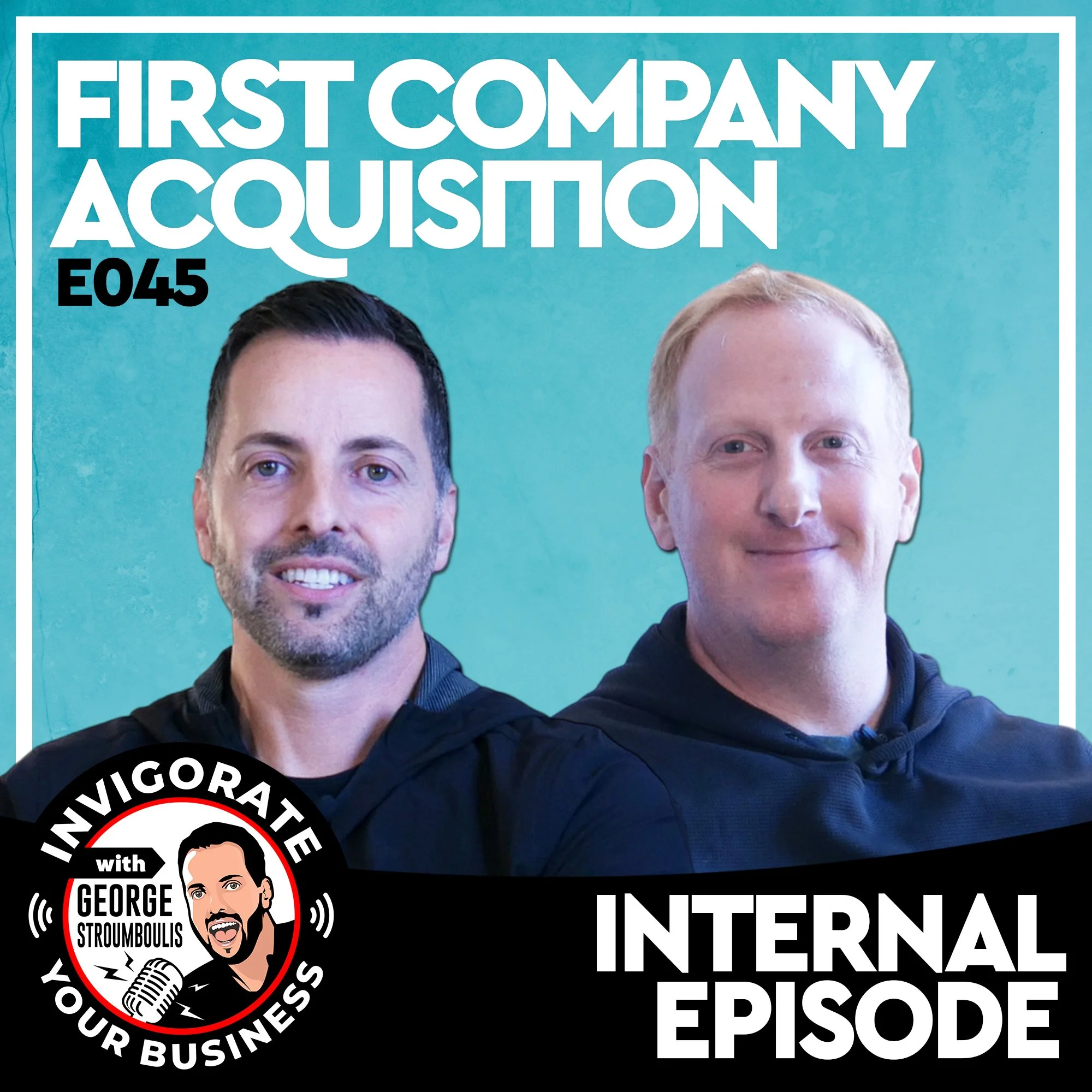
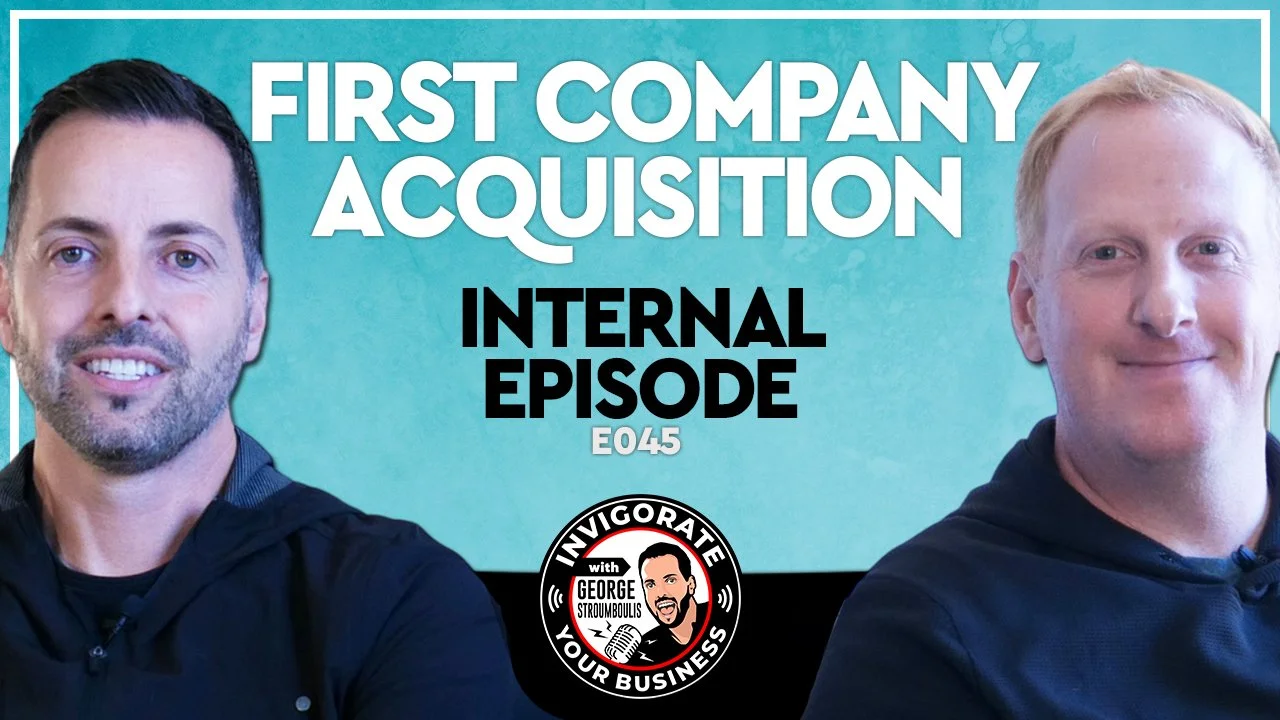
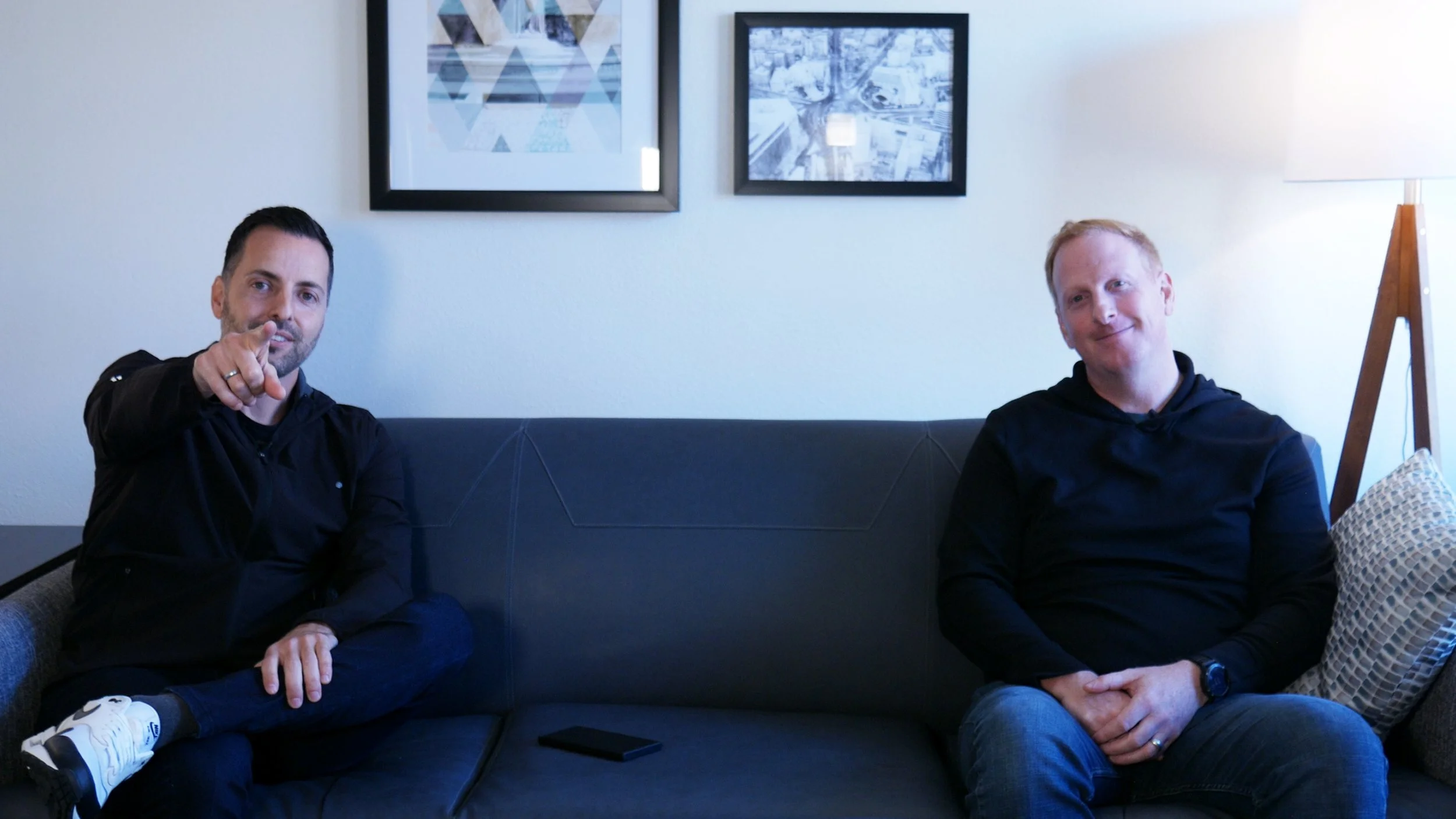
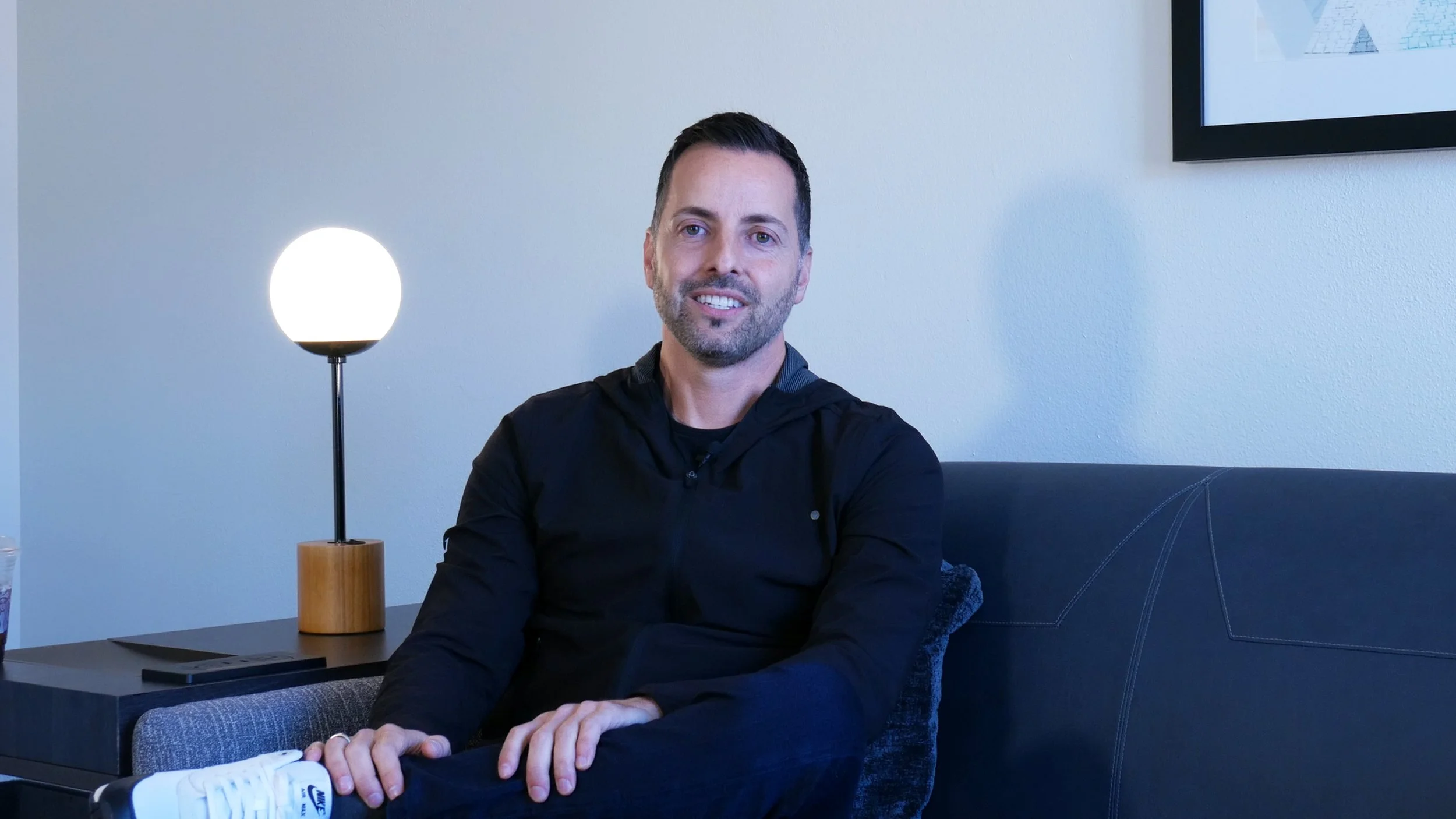
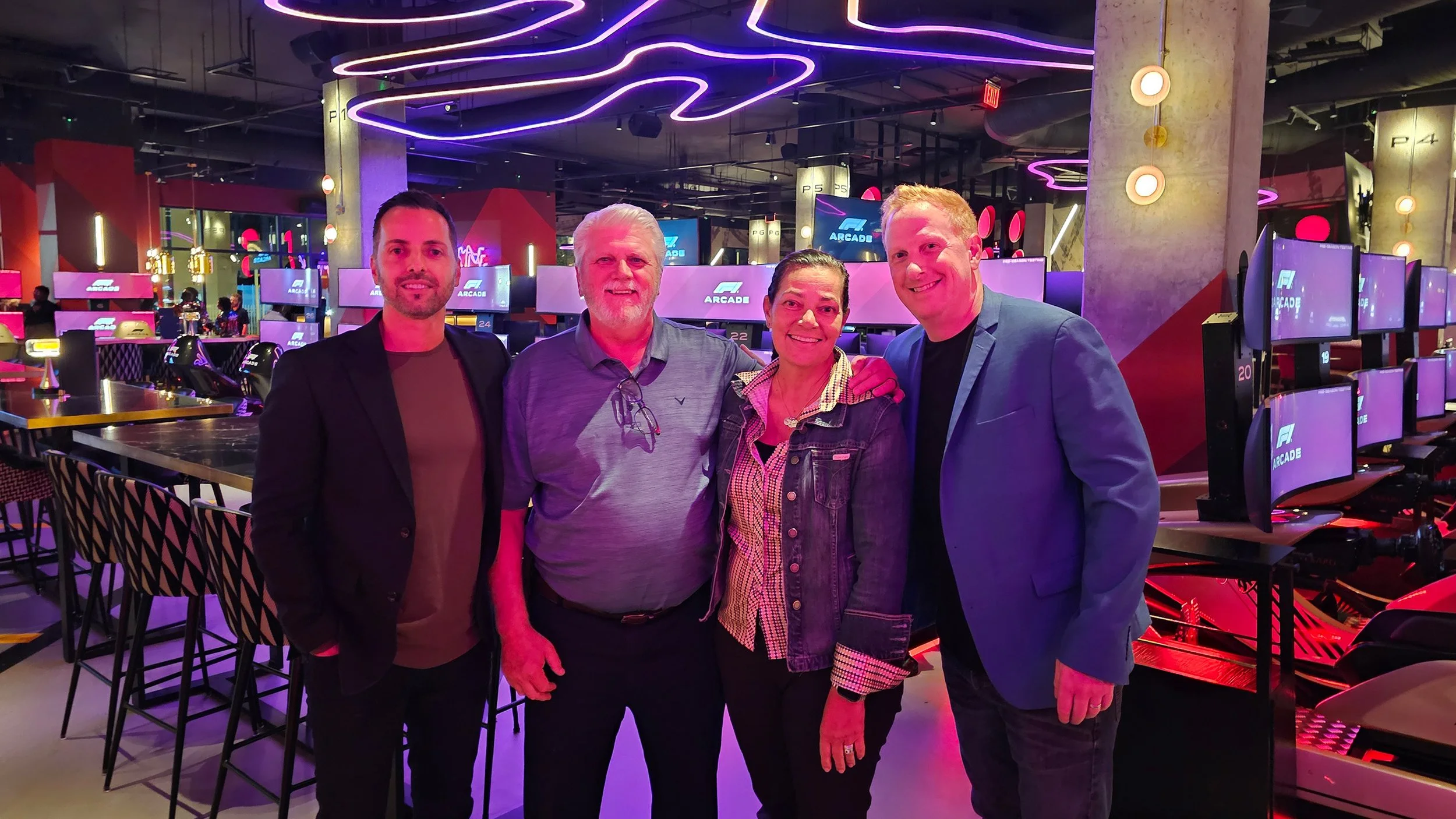
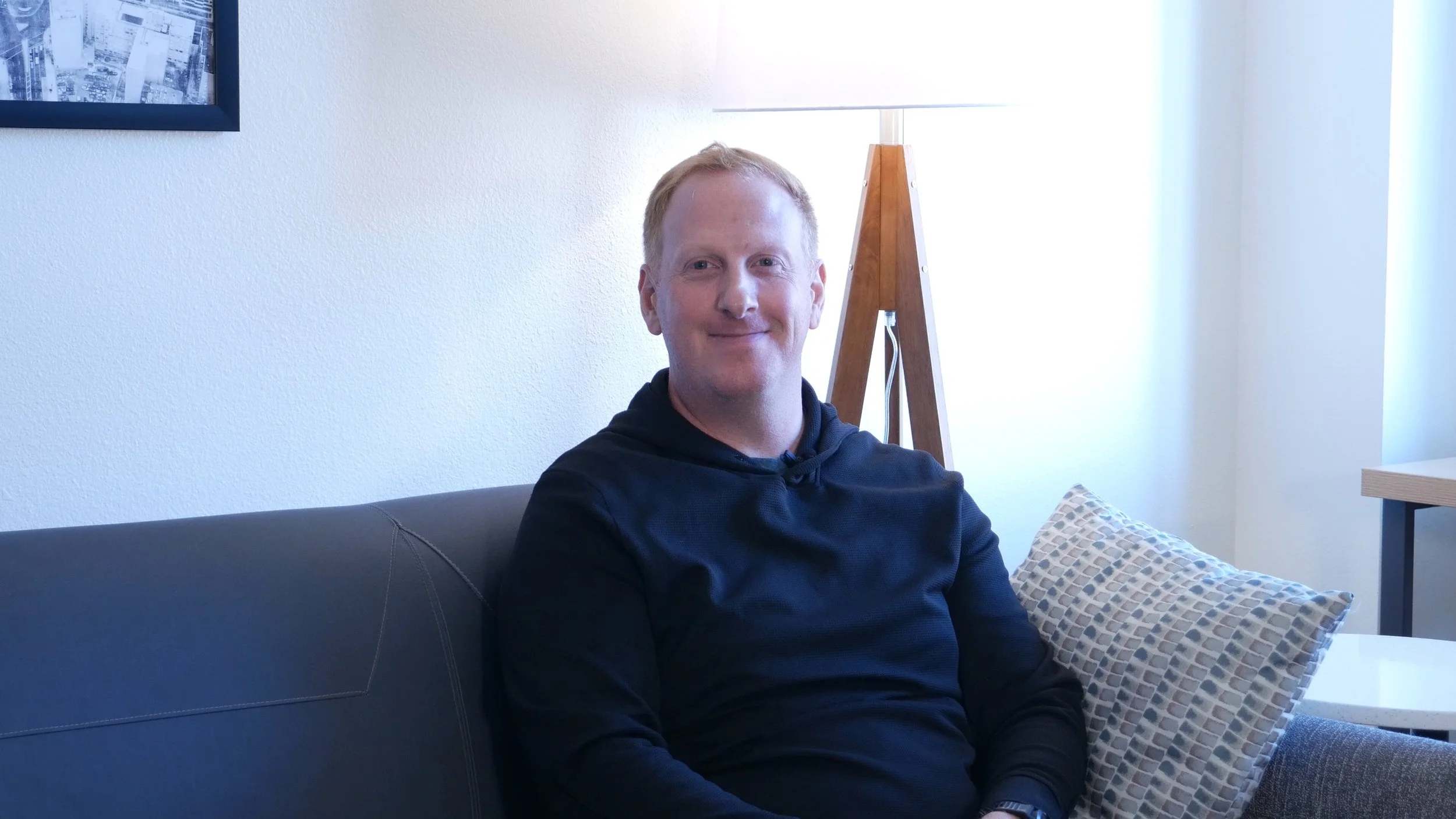
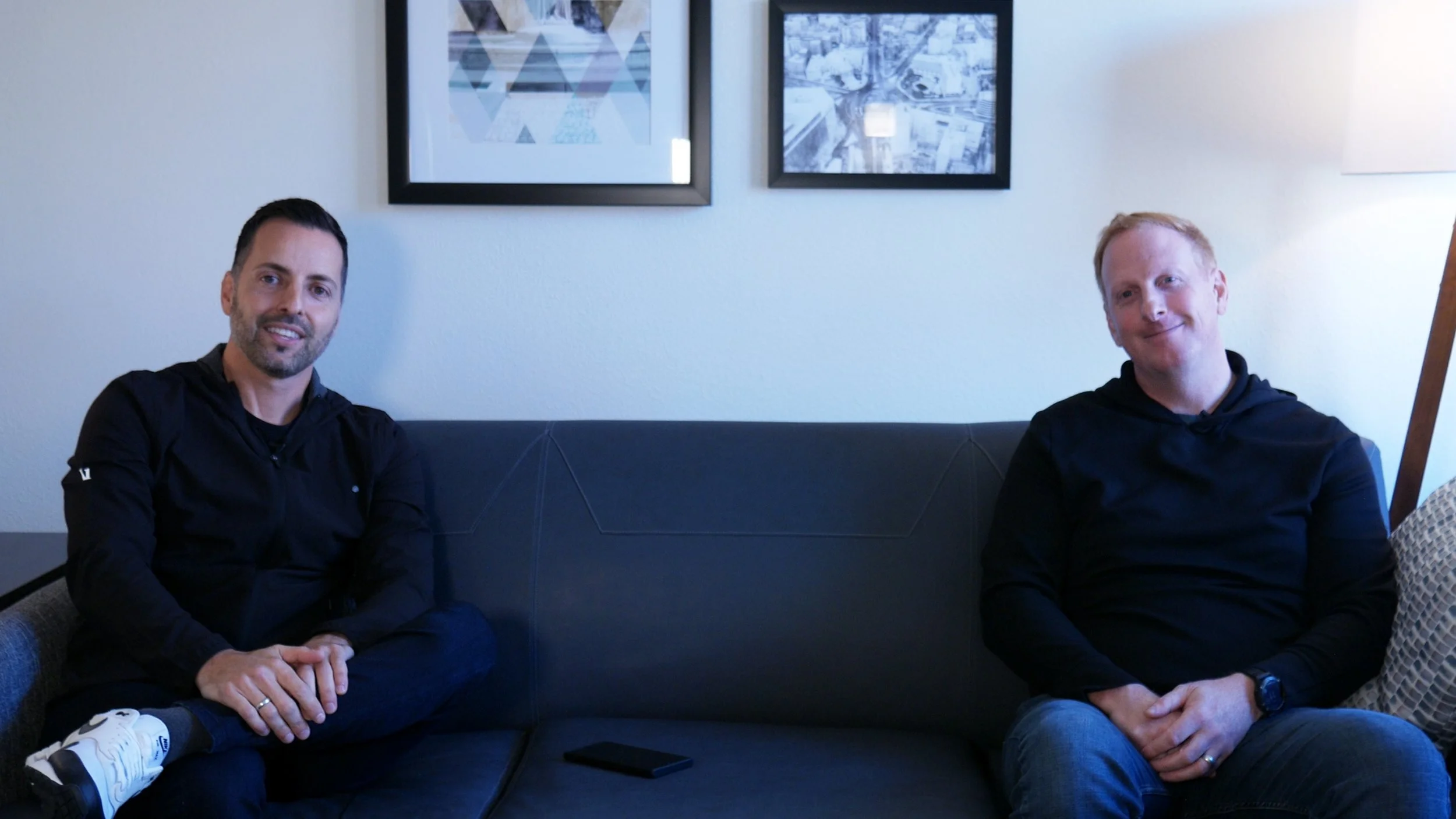
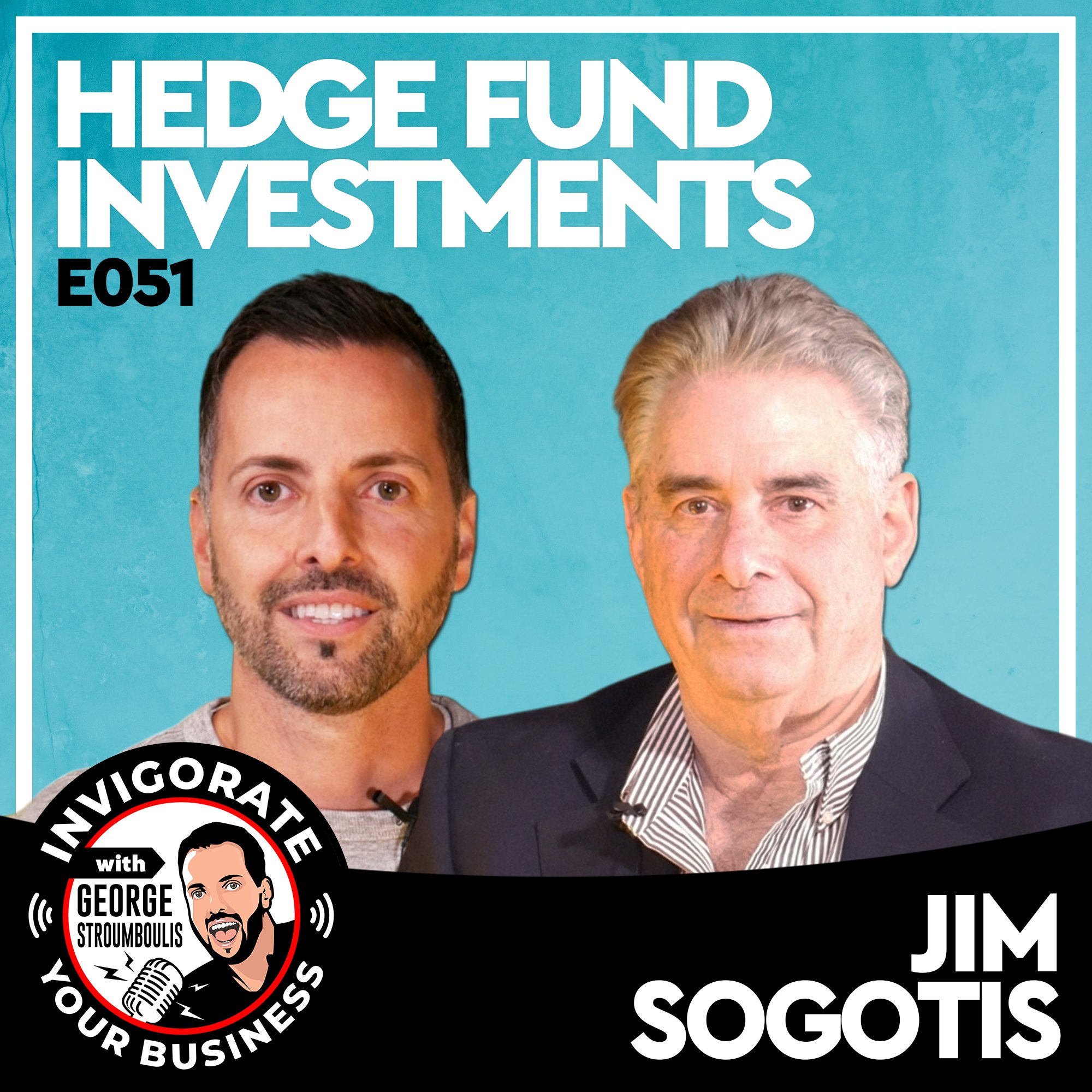
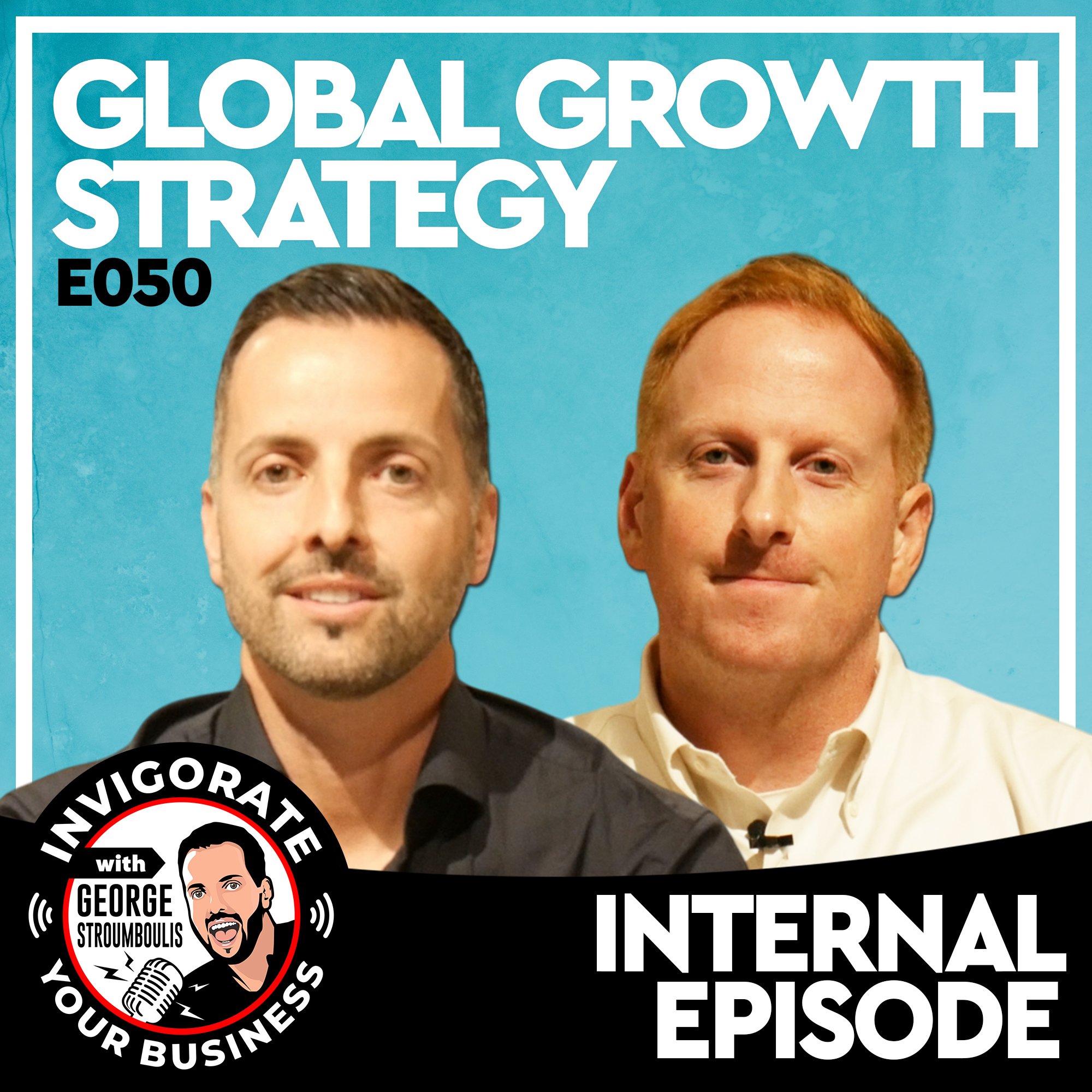


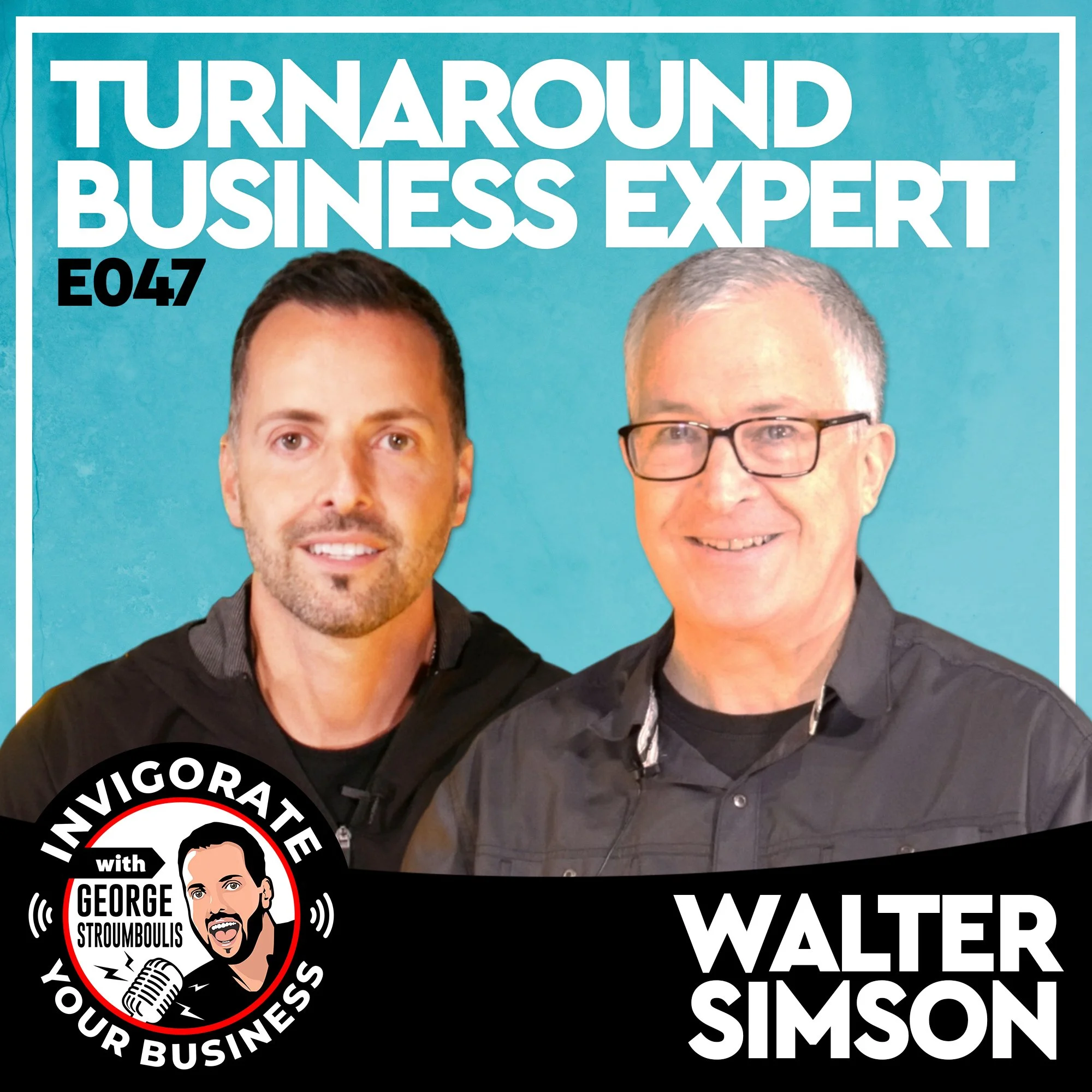
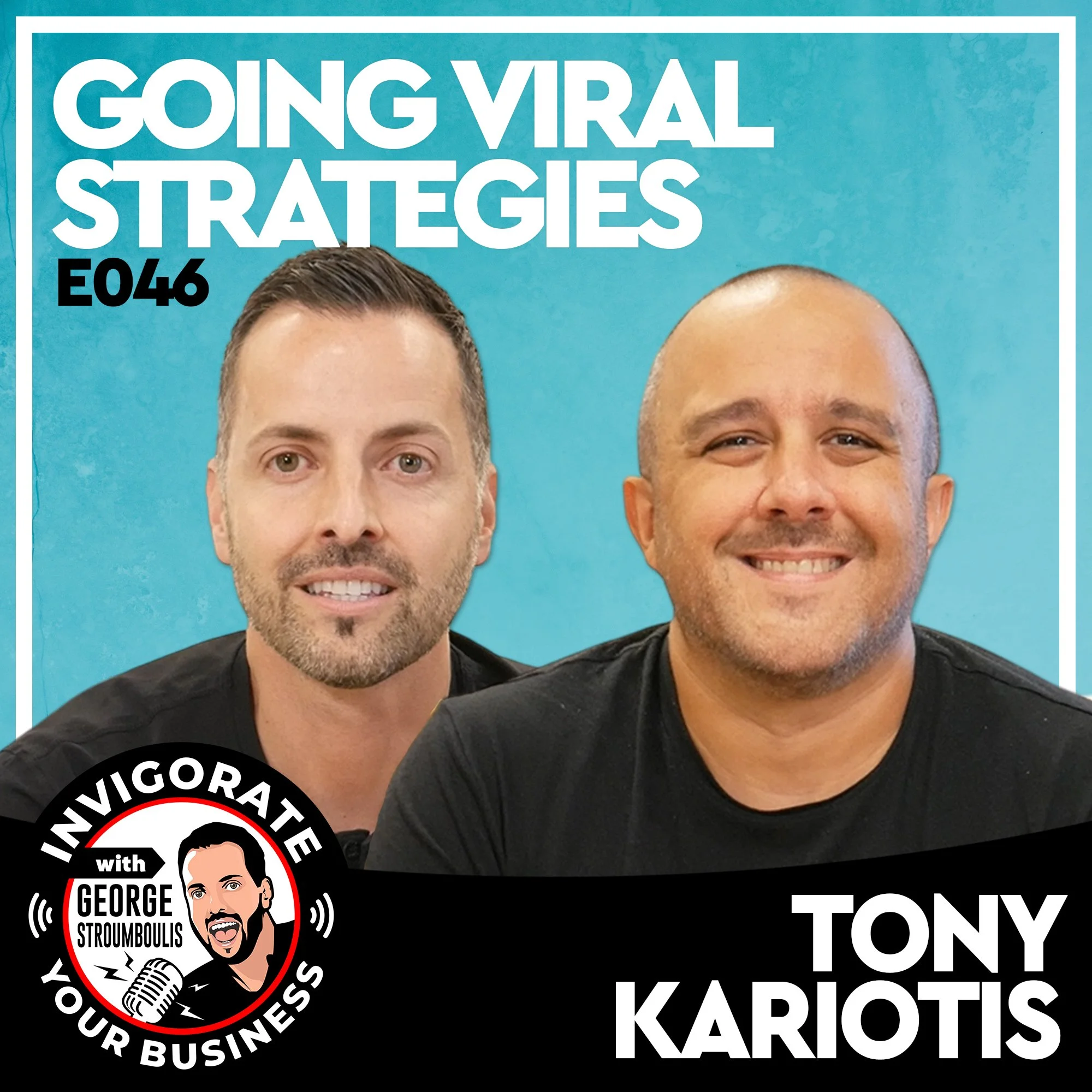

George Stroumboulis sits down with Thanasi Papoulias in Newport Beach, California on the Invigorate Your Business Podcast to talk about all things digital media, social media, influencing, online business strategies, celebrity interactions and so much more.